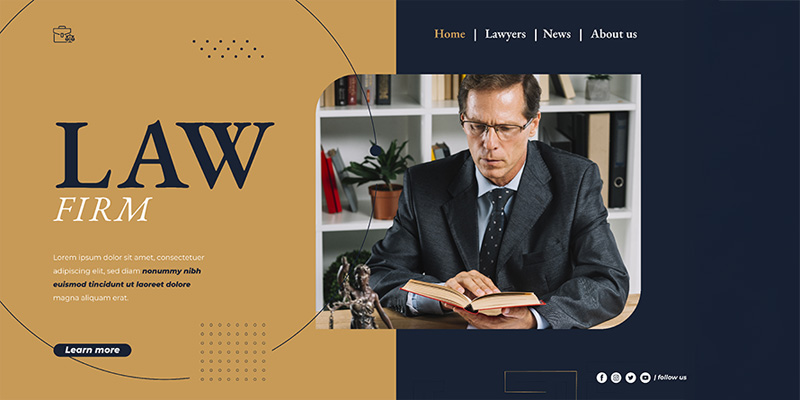Contents
Winning Strategies for Lawyer Website Content Today
Law firms are more and more forced to differentiate themselves on the web, and well-crafted lawyer web content is essential to making this a possibility. Prospective clients typically base their initial impressions on professionalism, relevance, and clarity of a firm’s web presence. Successful lawyer content must be able to illustrate legal competence along with a sharp awareness of client issues. A thoughtful law website content strategy can help build credibility, improve search rankings, and drive qualified leads. In this article, we’ll explore actionable strategies to create content that supports visibility, trust, and growth.
Crafting Lawyer Website Content That Converts
I. Understand Your Audience’s Legal Needs
To create effective lawyer website content, it is necessary to understand the concerns, questions, and motivations of prospective clients. People visiting a law firm’s website are often facing urgent or complex legal challenges. The content should directly address these needs with clear explanations of legal services, straightforward descriptions of how the firm can help, and answers to common questions. Incorporating data from client intake forms, frequently asked questions, and consultation notes can help refine the message. Each page should anticipate what a visitor is looking for and provide precise, trustworthy information that guides them to take the next step.
II. Use Clear Language and Direct Messaging
Legal terminology must be used accurately, but the overall tone should remain accessible. While legal concepts may be complex, writing should avoid jargon that confuses readers. Direct messaging helps convey confidence and professionalism without sounding aggressive or promotional. Content for attorneys must balance legal accuracy with user-friendly language, presenting complex matters in a way that’s easy for clients to understand. Call-to-action statements should also be concise, helping guide users to contact the firm, schedule a consultation, or explore specific services.
III. Highlight Core Practice Areas on Key Pages
Every law firm has specific areas of expertise, and these should be prominently featured. Practice area pages are not only useful for prospective clients—they are also critical for SEO. A well-organized law website content strategy ensures that each area of practice is presented in its own section, with supporting information such as related case types, legal processes, and common outcomes. Each section should provide enough detail to establish authority, while still encouraging the reader to get in touch for personalized advice. Internal linking between related practice areas can further enhance user navigation and search engine indexing.

Building Trust Through High-Impact Content for Attorneys
I. Showcase Real-World Legal Experience
Demonstrating relevant legal experience is essential for building client confidence. Prospective clients want assurance that their concerns will be handled by attorneys with proven skill and success in similar matters. Content for attorneys should include specific examples of past cases, legal outcomes, or areas of specialization. While client confidentiality must be maintained, sharing general case types and results can help establish credibility. Attorneys may also reference publications, speaking engagements, or legal commentary to reinforce their practical knowledge and insight.
II. Include Attorney Bios with Credentials
Attorney biography pages are often among the most visited on a law firm’s website. These pages should include full names, academic and professional credentials, bar admissions, and years of experience. Beyond listing qualifications, bios should highlight the attorney’s specific areas of practice and achievements. A well-crafted biography is a central part of lawyer website content, providing a personal yet professional overview that positions the attorney as both accessible and authoritative. Including professional photos, associations, and volunteer activities can also humanize the attorney while supporting a trustworthy image.
III. Publish Verified Client Testimonials
Testimonials play a critical role in building trust and validating the firm’s reputation. Verified reviews offer social proof that others have had a positive experience, especially when these statements speak to the attorney’s communication, reliability, and outcomes. All testimonials should be accurate, relevant, and compliant with state bar advertising rules. Featuring testimonials throughout the law website content—not only on a dedicated page—can increase visibility and reinforce trust across multiple sections of the site. Where possible, include the client’s name, location, or type of case to enhance authenticity.
Writing Law Website Content for Google’s E-E-A-T
I. Experience: Share Legal Case Insights
Google’s content quality standards prioritize Experience, which refers to the author’s first-hand knowledge of a subject. In legal content, this can be demonstrated by sharing insights gained through actual practice. Discussing common case types, courtroom procedures, or frequently encountered legal challenges can show depth of experience. When describing scenarios, use anonymized but realistic examples to help potential clients understand how legal strategies are applied in practice. These narratives not only improve the user’s understanding but also signal to search engines that the content is based on real legal work.
II. Expertise: Use Legal Terminology Properly
Expertise refers to the technical knowledge needed to provide reliable information in a specific field. For legal professionals, this includes correct usage of statutes, legal terms, and procedural references. Misused terminology can damage credibility with both readers and search engines. Content for attorneys must reflect a high standard of legal writing, avoiding simplifications that could mislead or misinform. Where necessary, define complex terms in plain language while maintaining legal accuracy. Citations to recognized legal sources can further support claims and enhance the article’s informational value.
III. Authoritativeness: Link to Reputable Sources
Authoritativeness signals that the information comes from a respected and knowledgeable source. Law firms can strengthen their content by linking to courts, statutes, bar associations, and well-known legal publications. These references help establish the firm’s content as reliable and well-sourced. Authoritativeness also benefits from visible affiliations, such as awards, certifications, and mentions in external media. Incorporating these references into lawyer website content demonstrates that the firm is recognized within the legal community and provides information consistent with accepted standards.
IV. Trustworthiness: Keep Policies Transparent
Trustworthiness is a critical factor in Google’s E-E-A-T framework, especially for industries like legal services where accuracy and integrity are essential. A law firm’s website should include clear privacy policies, terms of use, and disclaimers where appropriate. Law website content should never include exaggerated claims, and it should be regularly reviewed to ensure information is current. Contact information, office locations, and attorney credentials should be easily accessible and verifiable. Consistency in tone, formatting, and message across the site also contributes to an impression of reliability and professionalism.
Creating a Legal Content Strategy That Performs
I. Define Clear Goals for Each Content Type
An effective legal content strategy begins with specific objectives for every piece of content. Pages may serve different purposes—some are designed to inform, others to convert, and some to improve search engine visibility. Before creating or updating content, it is essential to identify its role within the larger website structure. For instance, a blog post may aim to explain a legal development, while a practice area page must guide users to book a consultation. Lawyer website content should align with measurable goals such as increased contact form submissions, longer page visits, or higher search rankings.
II. Map Content to the Client Journey
Legal clients move through a decision-making process that begins with research and ends with selecting a law firm. Each phase—awareness, consideration, and decision—requires a different approach to messaging. At the awareness stage, educational content can help users understand their legal situation. During consideration, more detailed resources such as FAQs or service comparisons can differentiate the firm from competitors. For the decision stage, testimonials, case studies, and direct calls to action are effective. Structuring content for attorneys to match this path improves engagement and increases the likelihood of contact.
III. Balance SEO with Human Readability
Search engine optimization (SEO) ensures that potential clients find a law firm’s content through organic search. However, content must also meet the expectations of real users. Keyword placement, metadata, and structured headings are all vital for SEO, but they should not compromise clarity or tone. Law website content should be written in a way that flows naturally, provides value, and maintains legal accuracy. Overuse of keywords or awkward phrasing can reduce trust and lower conversion rates. Instead, focus on writing for the reader first, then optimizing the content to support visibility without sacrificing quality.
Using Topic Clusters to Strengthen Lawyer Website Content
I. Identify Related Legal Subtopics
Topic clusters are an effective way to structure content in a way that supports both user experience and search engine optimization. A cluster begins with a central pillar page—typically a main practice area—and branches into supporting subtopics. For example, a family law pillar page may be connected to pages on child custody, spousal support, and property division. Each subtopic should be covered in detail, with a clear link back to the primary page. This method helps organize lawyer website content in a way that reflects the actual legal services offered while also improving site navigation.
II. Connect Pages with Internal Links
Internal linking between cluster pages signals to search engines that the pages are related and reinforces their relevance. It also helps users find related information easily, reducing bounce rates and encouraging longer session durations. Strategic linking between general and specific topics ensures that important information is discoverable and contextually placed. Content for attorneys should include deliberate anchor text that reflects legal terminology and mirrors common search queries. This practice not only aids user comprehension but also strengthens the site’s topical authority.
III. Keep Content Updated with New Rulings
Legal standards and interpretations can shift rapidly due to court decisions, legislative updates, and regulatory changes. Law website content must be updated regularly to reflect these changes and maintain accuracy. Outdated legal guidance can damage credibility and reduce the effectiveness of SEO efforts. Content management systems should include review schedules, version control, and clear ownership for each page. Revising and refreshing content also presents opportunities to expand coverage of emerging legal topics and improve the overall quality of the website.
SEO Tips for Law Website Content that Ranks
I. Target Local Search Phrases
Most legal services are location-specific, which makes local search optimization essential for visibility. Law firms should incorporate geo-targeted keywords—such as city or regional names—into key areas like page titles, headings, and meta descriptions. Local landing pages should also be created for each office location or service area to better match user intent. Law website content that prioritizes geographic relevance is more likely to appear in searches by users seeking legal help in specific jurisdictions. Including local court names, landmarks, and community references can further enhance relevance.
II. Optimize Headlines and Meta Descriptions
Headlines must be both descriptive and engaging while accurately reflecting the page’s content. Clear, concise titles help search engines understand the page topic and encourage users to click. Meta descriptions, although not a direct ranking factor, influence click-through rates by summarizing what users can expect from a page. Every piece of lawyer website content should include well-crafted meta elements that align with user queries and offer value. Using primary keywords naturally in both headlines and meta descriptions supports visibility without keyword stuffing.
III. Use Schema Markup Where Possible
Schema markup is a form of structured data that helps search engines interpret the context of content. For law firms, adding schema elements such as attorney profiles, reviews, practice areas, and contact information improves how content appears in search results. This can lead to enhanced features like rich snippets, which display extra details under a listing. Content for attorneys that includes schema is better positioned for higher visibility and increased user trust. It also supports voice search and other advanced search formats by providing clearer semantic context.
Avoiding Common Mistakes in Content for Attorneys
I. Skipping Proofreading or Fact-Checking
Legal content must meet a high standard of accuracy. Errors in grammar, citations, or legal facts can reduce credibility and create risk. Every piece of content for attorneys should be reviewed by a qualified editor or legal professional before publication. Proofreading ensures clarity and professionalism, while fact-checking confirms that legal references are current and correct. Mistakes not only affect the perception of competence but may also result in ethical or regulatory issues depending on the jurisdiction.
II. Writing Generic, Thin Pages
Low-quality pages that lack substance or repeat general information do not perform well in search results. Generic content fails to differentiate the firm and often provides no meaningful insight to users. Thin pages with minimal word count or unclear focus are commonly ignored by search engines. Law website content should be comprehensive, specific, and relevant to the intended audience. Including original perspectives, detailed explanations, and case-related context helps establish authority and supports engagement. Content that simply restates widely available information offers little value.
III. Ignoring Mobile Optimization
Many users access legal websites on mobile devices. If the content does not display properly or load quickly, users may leave without taking action. Mobile-friendly design is not only critical for user experience but also affects search engine rankings. Lawyer website content must be easy to read on smaller screens, with responsive formatting, accessible fonts, and intuitive navigation. Pages should be tested across multiple devices to ensure consistency and usability. Prioritizing mobile performance enhances accessibility and supports conversion goals.
Final Verdict: Make Your Legal Content Work Harder
Law firms that invest in thoughtful, well-structured lawyer website content position themselves to attract and convert more qualified leads. From showcasing legal experience to targeting local SEO, each element of your content strategy should serve a defined purpose. Clarity, trust, and relevance are essential not just for users, but also for satisfying Google’s E-E-A-T standards. Done right, your website becomes more than a digital brochure—it becomes a tool for visibility, credibility, and sustained client growth.
Maintaining high-quality content for attorneys means balancing legal accuracy with usability. Regular updates, proper formatting, and a focus on topic relevance ensure that your law website content performs well in search and delivers real value to readers. Avoid shortcuts, monitor performance, and refine your strategy to reflect changes in client behavior or legal trends. Content is not just an add-on to your firm’s marketing—it’s a long-term investment in reputation and results.
Turn Your Content into Clients with RunSensible
Whether you’re writing lawyer website content or managing daily client communications, RunSensible gives your law firm the tools to grow faster with less effort. Our all-in-one legal platform helps you manage contacts, automate follow-ups, track leads, and publish optimized content for attorneys—all from one dashboard.
Streamline your casework, organize your calendar, and create law website content that works seamlessly with your marketing goals. RunSensible is built for modern law firms that want to stay organized, stay visible, and stay ahead. Try it today and turn every click into a consultation.
FAQs
1. What makes effective lawyer website content?
Effective lawyer website content clearly explains your legal services, reflects your firm’s professionalism, and guides visitors to take action. It should be accurate, well-organized, and aligned with search engine optimization best practices.
2. How often should I update content for attorneys on my website?
Content for attorneys should be reviewed at least quarterly. Update it whenever laws change, your services expand, or you want to improve search performance. Keeping content current helps maintain accuracy and trust.
3. What’s the difference between general legal information and law website content?
General legal information explains broad topics, while law website content is tailored to your specific services, jurisdiction, and audience. It should support your firm’s goals by answering client questions and encouraging engagement.
4. How can I improve SEO using lawyer website content?
To boost SEO, use relevant keywords, structure content with clear headings, and include internal links. Optimize for local searches by referencing your city or region and ensure all technical SEO elements are in place.
5. Should all content for attorneys include legal disclaimers?
Yes, adding disclaimers helps clarify that the information provided is not legal advice. Disclaimers are especially important for blog posts and educational pages to protect your firm from liability and set clear expectations.
References
- https://www.findlaw.com/lawyer-marketing/blog/actionable-content-strategies-for-law-firms/
- https://www.lawfuel.com/law-firm-marketing-content-marketing-for-law-firms-in-2025/
- https://www.jdsupra.com/legalnews/the-ultimate-guide-to-content-marketing-4699589/
- https://blog.iftsdesign.com/content-marketing-in-2025-essential-strategies-for-law-firms-to-attract-and-retain-clients/
- https://www.bestlawyers.com/article/content-marketing-law-firms-strategies-success/6183
Disclaimer: The content provided on this blog is for informational purposes only and does not constitute legal, financial, or professional advice.







